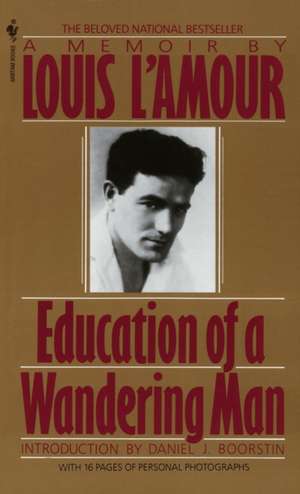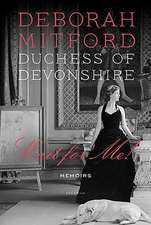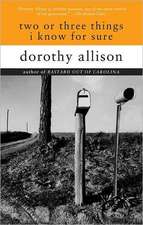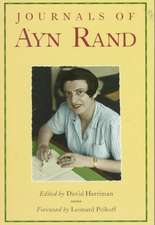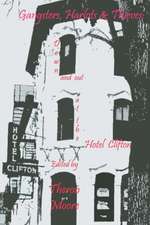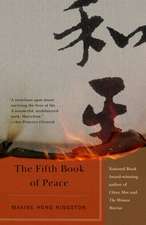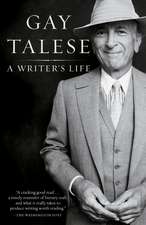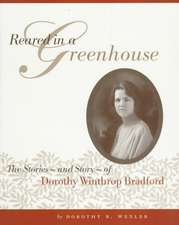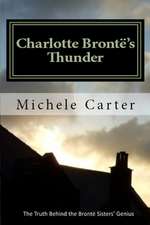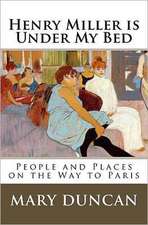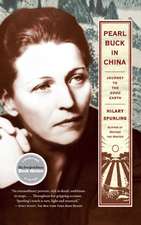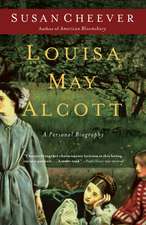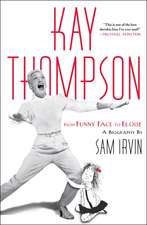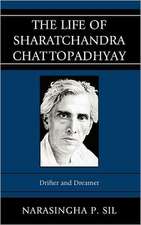Education of a Wandering Man
Autor Louis L'Amouren Limba Engleză Paperback – 31 oct 1990 – vârsta de la 14 până la 18 ani
Preț: 48.84 lei
Nou
Puncte Express: 73
Preț estimativ în valută:
9.35€ • 9.78$ • 7.73£
9.35€ • 9.78$ • 7.73£
Carte disponibilă
Livrare economică 17-31 martie
Livrare express 28 februarie-06 martie pentru 17.08 lei
Preluare comenzi: 021 569.72.76
Specificații
ISBN-13: 9780553286526
ISBN-10: 0553286528
Pagini: 258
Dimensiuni: 102 x 168 x 8 mm
Greutate: 0.14 kg
Editura: Bantam Books
ISBN-10: 0553286528
Pagini: 258
Dimensiuni: 102 x 168 x 8 mm
Greutate: 0.14 kg
Editura: Bantam Books
Notă biografică
Louis L’Amour is undoubtedly the bestselling frontier novelist of all time. He is the only American-born author in history to receive both the Presidential Medal of Freedom, and the Congressional Gold Medal in honor of his life's work. He has published ninety novels; twenty-seven short-story collections; two works of nonfiction; a memoir, Education of a Wandering Man; and a volume of poetry, Smoke from This Altar. There are more than 300 million copies of his books in print worldwide.
From the Hardcover edition.
From the Hardcover edition.
Extras
1
IT WAS MAY 14. In a few days my class back in Jamestown, North Dakota would be graduating from high school, and I was in Singapore.
The date is one of the few I know from those knockabout years, simply because I had the good sense to write it on the inside cover of a book I bought at the shop of Muhammed Dulfakir on the corner of High Street. The book was Kipling’s Departmental Ditties, and my reason for buying it was that I had forgotten a line or two from a poem I liked to recite, “The Ballad of Fisher’s Boarding House.”
During those years I often recited poetry in bunkhouses in mining or lumber camps, and in ship’s fo’c’sles. It was usually the verse of Robert W. Service or Rudyard Kipling, but there was a lot of poetry floating around written for, and often by, the kind of men we were, occasionally printed but usually passed from memory to memory.
On that day several of my shipmates had gathered around a table or two in the Maypole Bar, a place no doubt long forgotten. Such men as “Hans, the blue-eyed Dane” of Kipling’s poem would have known it, and probably British soldiers stationed in town. It was a nondescript bar, convenient to the waterfront.
This is not the story of how I came to be in Singapore. That will be told elsewhere. This is a story of an adventure in education, pursued not under the best of conditions. The idea of education has been tied to schools, universities, and professors that many assume there is no other way, but education is available to anyone within reach of a library, a post office, or even a newsstand.
Today you can buy the Dialogues of Plato for less than you would spend on a fifth of whiskey, or Gibbon’s Decline and Fall of the Roman Empire for the price of a cheap shirt. You can buy a fair beginning of an education in any bookstore with a good stock of paperback books for less than you would spend on a week’s supply of gasoline.
Often I hear people say they do not have time to read. That’s absolute nonsense. In the one year during which I kept that kind of record, I read twenty-five books while waiting for people. In offices, applying for jobs, waiting to see a dentist, waiting in a restaurant for friends, many such places. I read on buses, trains, and planes. If one really wants to learn, one has to decide what is important. Spending an evening on the town? Attending a ball game? Or learning something that can be with you your life long?
Byron’s Don Juan I read on an Arab dhow sailing north from Aden up the Red Sea to Port Tewfik on the Suez Canal. Boswell’s Life of Samuel Jackson I read while broke and on the beach in San Pedro. In Singapore, I came upon a copy of The Annals and Antiquities of Rajahstan by James Tod. It was in the library of a sort of YMCA for seamen, the name of which I’ve forgotten but which any British sailor of the time would remember, for the British had established them in many ports, for sailors ashore.
At that time I could no more than skim the James Tod book, reading only a few chapters before I was off to sea again. But a few years ago I located a secondhand copy in a bookstore in Greenwich Village and it now rests on a shelf in my own library, a source for several planned books.
A great book begins with an idea; a great life, with a determination.
My life may not be great to others, but to me it has been one of steady progression, never dull, often exciting, often hungry, tired, and lonely, but always learning. Somewhere back down the years I decided, or my nature decided for me, that I would be a teller of stories.
Decisions had to be made and there was nobody but me to make them. My course altered a number of times but never deviated from the destination I had decided upon. Whether this was altogether a matter of choice I do not know. Perhaps my early reading and the storytelling at home had preconditioned me for the role I adopted.
Somewhere along the line I had fallen in love with learning, and it became a lifelong romance. Early on I discovered it was fun to follow along the byways of history to find those treasures that await any searcher. It may be that all later decisions followed naturally from that first one.
One thing has always been true: That book or that person who can give me an idea or a new slant on an old idea is my friend.
And there have been many such.
Right here I wish to say that what follows is not an autobiography, although no doubt these materials are a piece of the final picture, which I hope to undertake later.
As can be guessed from the title, this book is about education, but not education in the accepted sense. No man or woman has a greater appreciation for schools than I, although few have spent less time in them. No matter how much I admire our schools, I know that no university exists that can provide an education; what a university can provide is an outline, to give the learner a direction and guidance. The rest one has to do for oneself.
If I were asked what education should give, I would say it should offer breadth of view, easy of understanding, tolerance for others, and a background from which the mind can explore in any direction.
Education should provide the tools for a widening and deepening of life, for increased appreciation of all one sees or experiences. It should equip a person to live life well, to understand what is happening about him, for to live life well one must live with awareness.
No one can “get” an education, for of necessity education is a continuing process. If it does nothing else, it should provide students with the tools for learning, acquaint them with methods of study and research, methods of pursuing an idea. We can only hope they come upon an idea they wish to pursue.
In the United States we have concentrated tremendous sums of money on the educational plant, seemingly with the idea that the right number of buildings will turn out the right number of graduates. Yet the teachers who actually instruct the future citizens of our country are more often than not miserably paid. If in the future we find ourselves with a lot of fourth-rate citizens, we have only ourselves to blame.
Education depends on the quality of the teacher, not the site or beauty of the buildings—nor, I might add, does it depend on the winning record of the football team, and I like football.
It is constantly reiterated that education begins in the home, as indeed it does, but what is often forgotten is that morality begins in the home also.
It also begins in the car seat, where many a budding criminal career is born when the child not only watches his parent repeatedly break traffic laws, but hears him lie about it when caught. The example is not, supposedly, expected to influence the child.
My own education, which is the one I know most about, has been haphazard, a hit-and-miss affair that was and continues to be thoroughly delightful.
I came into the world with two priceless advantages: good health and a love of learning. When I left school at the age of fifteen I was halfway through the tenth grade. I left for two reasons, economic necessity being the first of them. More important was that school was interfering with my education.
Due to circumstances, it was essential that I go to work and try to support myself. This was no sacrifice, for it had been uppermost in my mind for some time. Several factors contributed to my discontent.
My first job was as messenger boy for the Western Union, a good job for a boy in my hometown. I got the job when I was twelve, and it was in the telegraph office that I first began to type. I cannot say that I learned to type–I began with two fingers and work with them still. It has been called the hunt-and-peck system, but over the years my fingers have become so used to the typewriter that I hunt very little and peck a lot.
Also, I was growing rapidly. At twelve I was the size of most other boys; at thirteen and a half I was my present height, which is six feet and one inch. The very effort of growing left me often tired. Through the first six grades my own grades were good, always at the top or close to the top. As a matter of fact, I was usually second, third, or fourth in the class, except in math. In my sixth grade, where we had a teacher who loved math, I several times made an A, or what corresponded to it.
Moving into the seventh grade, I discovered I had several compulsory subjects in which I considered myself qualified, at least to the extent provided by the school text. It was essential that I take a semester of ancient history, and I had already done much reading in the area.
I wished to skip the subject and take modern history, of which I knew very little. I also wished to skip general science and take chemistry. At the time I had helped build several crystal radio sets and had done some electroplating. At the library I had read from books on botany and geology.
Actually, the book on general science I read in the city library was much better, as well as much more interesting, than the school text, but the rules made no provisions for exceptions. I did not look forward to spending time studying subjects already covered.
Ours was a family in which everybody was constantly reading, and where literature, politics, history, and the events of the prize ring were discussed at breakfast, lunch, and dinner. We grew up with the names of H. G. Wells, George Bernard Shaw, John L. Sullivan, Bob Fitzsimmons, and Jack Dempsey as familiar to us as those of our own family, right along with Teddy Roosevelt, William Howard Taft, Woodrow Wilson, Sitting Bull, and Crazy House.
The Apache wars of which I was to write later occurred far away to the southwest, but the Sioux were close by. They had killed and scalped my own great-grandfather while he was with the Sibley command, pursuing the Santee Sioux out across Dakota in the aftermath of the bloody Little Crow massacre of 1862.
My education in domestic and foreign affairs began at home. My sister Edna was attending Jamestown College, and my two older brothers and a second sister were in school, constantly discussing and arguing about schoolwork, reciting poetry, and talking of books they were reading.
How many books we had in our home I do not remember, and doubt if anyone ever counted. We had collections of Longfellow, Whittier, Lowell, and Emerson, as well as the Stoddard lectures on travel. All of us had library cards, and they were always in use. Reading was as natural to us as breathing.
When I moved on from children’s books and fairy tales, one of the first books I read was Robert Louis Stevenson’s Treasure Island.
I had begun reading earlier than most, because my sister Emmy Lou, no doubt to keep me from bothering her, decided it was easier to teach me to read stories to myself rather than to read them to me, as she had been doing.
What books I read immediately after that, or their progression, I do not remember, but certainly they were for a time the simplest of children’s books. I do know that when I was in the fifth grade my father told me he would give me a three-volume History of the World if I would read it. The books had come as a premium with a subscription to Collier’s magazine, if I recall correctly. For the next few months, when my father came home I would sit on his knee and tell him what I had read during the day.
The books had a buff binding, a good many pictures, and fairly large print, so they must have been very general indeed.
Other books remembered from those years were Black Beauty, a similar book about a dog called Beautiful Joe (who was not beautiful at all), Little Lord Fauntleroy, Pilgrim’s Progress (which I found very dull), John Halifax, Gentleman, and two old favorites, Cudjo’s Cave and The Little Shepherd of Kingdom Come.
My older brothers had left behind a dozen Horatio Alger novels, which I read, but I remember only three titles: Brave and Bold, Do and Dare, and Jed, the Poorhouse Boy.
About the same time, I read at least a dozen novels by G. A. Henty, a British author. The only two recalled offhand were The Lion of the North, about Gustavus Adolphus of Sweden, and With Clive in India. Aside from teaching much more about aspects of history studied in school, they provided at least a passing familiarity with events our schools did not touch upon. These deepened my interest in history and brought not questions but rather a desire to know more about what actually happened and why.
Historical novels are, without question, the best way of teaching history, for they offer the human stories behind the events and leave the reader with a desire to know more. Due to such books, and later reading, I found that no matter what country I visited or whom I met, I knew something of the history or romance of the country, or about a person’s homeland.
My father, who was a veterinarian working mostly with horses and cattle, was a great storyteller. In small towns in those days nearly every public official had some other business, and my father was at various times a deputy sheriff, a policeman, a Juvenile Commissioner, and for many years was alderman of the First Ward, the largest in the city. At one time he even ran for mayor but was defeated by a good friend.
He told stories of his boyhood in the lumber woods, of a pet bear and deer he owned, of a Huron Indian boy with whom he played. My mother, too, told stories, usually of her relatives in Minnesota or of her father, a veteran of the Civil and Indian Wars who lived with us when I was very small.
Supposedly I was too young to remember him well, but often when we were alone he drew diagrams on a slate and told me how the great battles of history were fought, and about some of his own wars. I should not have remembered, but years later I could draw a diagram of how the Battle of Cannae was won, and I did not study that until later.
IT WAS MAY 14. In a few days my class back in Jamestown, North Dakota would be graduating from high school, and I was in Singapore.
The date is one of the few I know from those knockabout years, simply because I had the good sense to write it on the inside cover of a book I bought at the shop of Muhammed Dulfakir on the corner of High Street. The book was Kipling’s Departmental Ditties, and my reason for buying it was that I had forgotten a line or two from a poem I liked to recite, “The Ballad of Fisher’s Boarding House.”
During those years I often recited poetry in bunkhouses in mining or lumber camps, and in ship’s fo’c’sles. It was usually the verse of Robert W. Service or Rudyard Kipling, but there was a lot of poetry floating around written for, and often by, the kind of men we were, occasionally printed but usually passed from memory to memory.
On that day several of my shipmates had gathered around a table or two in the Maypole Bar, a place no doubt long forgotten. Such men as “Hans, the blue-eyed Dane” of Kipling’s poem would have known it, and probably British soldiers stationed in town. It was a nondescript bar, convenient to the waterfront.
This is not the story of how I came to be in Singapore. That will be told elsewhere. This is a story of an adventure in education, pursued not under the best of conditions. The idea of education has been tied to schools, universities, and professors that many assume there is no other way, but education is available to anyone within reach of a library, a post office, or even a newsstand.
Today you can buy the Dialogues of Plato for less than you would spend on a fifth of whiskey, or Gibbon’s Decline and Fall of the Roman Empire for the price of a cheap shirt. You can buy a fair beginning of an education in any bookstore with a good stock of paperback books for less than you would spend on a week’s supply of gasoline.
Often I hear people say they do not have time to read. That’s absolute nonsense. In the one year during which I kept that kind of record, I read twenty-five books while waiting for people. In offices, applying for jobs, waiting to see a dentist, waiting in a restaurant for friends, many such places. I read on buses, trains, and planes. If one really wants to learn, one has to decide what is important. Spending an evening on the town? Attending a ball game? Or learning something that can be with you your life long?
Byron’s Don Juan I read on an Arab dhow sailing north from Aden up the Red Sea to Port Tewfik on the Suez Canal. Boswell’s Life of Samuel Jackson I read while broke and on the beach in San Pedro. In Singapore, I came upon a copy of The Annals and Antiquities of Rajahstan by James Tod. It was in the library of a sort of YMCA for seamen, the name of which I’ve forgotten but which any British sailor of the time would remember, for the British had established them in many ports, for sailors ashore.
At that time I could no more than skim the James Tod book, reading only a few chapters before I was off to sea again. But a few years ago I located a secondhand copy in a bookstore in Greenwich Village and it now rests on a shelf in my own library, a source for several planned books.
A great book begins with an idea; a great life, with a determination.
My life may not be great to others, but to me it has been one of steady progression, never dull, often exciting, often hungry, tired, and lonely, but always learning. Somewhere back down the years I decided, or my nature decided for me, that I would be a teller of stories.
Decisions had to be made and there was nobody but me to make them. My course altered a number of times but never deviated from the destination I had decided upon. Whether this was altogether a matter of choice I do not know. Perhaps my early reading and the storytelling at home had preconditioned me for the role I adopted.
Somewhere along the line I had fallen in love with learning, and it became a lifelong romance. Early on I discovered it was fun to follow along the byways of history to find those treasures that await any searcher. It may be that all later decisions followed naturally from that first one.
One thing has always been true: That book or that person who can give me an idea or a new slant on an old idea is my friend.
And there have been many such.
Right here I wish to say that what follows is not an autobiography, although no doubt these materials are a piece of the final picture, which I hope to undertake later.
As can be guessed from the title, this book is about education, but not education in the accepted sense. No man or woman has a greater appreciation for schools than I, although few have spent less time in them. No matter how much I admire our schools, I know that no university exists that can provide an education; what a university can provide is an outline, to give the learner a direction and guidance. The rest one has to do for oneself.
If I were asked what education should give, I would say it should offer breadth of view, easy of understanding, tolerance for others, and a background from which the mind can explore in any direction.
Education should provide the tools for a widening and deepening of life, for increased appreciation of all one sees or experiences. It should equip a person to live life well, to understand what is happening about him, for to live life well one must live with awareness.
No one can “get” an education, for of necessity education is a continuing process. If it does nothing else, it should provide students with the tools for learning, acquaint them with methods of study and research, methods of pursuing an idea. We can only hope they come upon an idea they wish to pursue.
In the United States we have concentrated tremendous sums of money on the educational plant, seemingly with the idea that the right number of buildings will turn out the right number of graduates. Yet the teachers who actually instruct the future citizens of our country are more often than not miserably paid. If in the future we find ourselves with a lot of fourth-rate citizens, we have only ourselves to blame.
Education depends on the quality of the teacher, not the site or beauty of the buildings—nor, I might add, does it depend on the winning record of the football team, and I like football.
It is constantly reiterated that education begins in the home, as indeed it does, but what is often forgotten is that morality begins in the home also.
It also begins in the car seat, where many a budding criminal career is born when the child not only watches his parent repeatedly break traffic laws, but hears him lie about it when caught. The example is not, supposedly, expected to influence the child.
My own education, which is the one I know most about, has been haphazard, a hit-and-miss affair that was and continues to be thoroughly delightful.
I came into the world with two priceless advantages: good health and a love of learning. When I left school at the age of fifteen I was halfway through the tenth grade. I left for two reasons, economic necessity being the first of them. More important was that school was interfering with my education.
Due to circumstances, it was essential that I go to work and try to support myself. This was no sacrifice, for it had been uppermost in my mind for some time. Several factors contributed to my discontent.
My first job was as messenger boy for the Western Union, a good job for a boy in my hometown. I got the job when I was twelve, and it was in the telegraph office that I first began to type. I cannot say that I learned to type–I began with two fingers and work with them still. It has been called the hunt-and-peck system, but over the years my fingers have become so used to the typewriter that I hunt very little and peck a lot.
Also, I was growing rapidly. At twelve I was the size of most other boys; at thirteen and a half I was my present height, which is six feet and one inch. The very effort of growing left me often tired. Through the first six grades my own grades were good, always at the top or close to the top. As a matter of fact, I was usually second, third, or fourth in the class, except in math. In my sixth grade, where we had a teacher who loved math, I several times made an A, or what corresponded to it.
Moving into the seventh grade, I discovered I had several compulsory subjects in which I considered myself qualified, at least to the extent provided by the school text. It was essential that I take a semester of ancient history, and I had already done much reading in the area.
I wished to skip the subject and take modern history, of which I knew very little. I also wished to skip general science and take chemistry. At the time I had helped build several crystal radio sets and had done some electroplating. At the library I had read from books on botany and geology.
Actually, the book on general science I read in the city library was much better, as well as much more interesting, than the school text, but the rules made no provisions for exceptions. I did not look forward to spending time studying subjects already covered.
Ours was a family in which everybody was constantly reading, and where literature, politics, history, and the events of the prize ring were discussed at breakfast, lunch, and dinner. We grew up with the names of H. G. Wells, George Bernard Shaw, John L. Sullivan, Bob Fitzsimmons, and Jack Dempsey as familiar to us as those of our own family, right along with Teddy Roosevelt, William Howard Taft, Woodrow Wilson, Sitting Bull, and Crazy House.
The Apache wars of which I was to write later occurred far away to the southwest, but the Sioux were close by. They had killed and scalped my own great-grandfather while he was with the Sibley command, pursuing the Santee Sioux out across Dakota in the aftermath of the bloody Little Crow massacre of 1862.
My education in domestic and foreign affairs began at home. My sister Edna was attending Jamestown College, and my two older brothers and a second sister were in school, constantly discussing and arguing about schoolwork, reciting poetry, and talking of books they were reading.
How many books we had in our home I do not remember, and doubt if anyone ever counted. We had collections of Longfellow, Whittier, Lowell, and Emerson, as well as the Stoddard lectures on travel. All of us had library cards, and they were always in use. Reading was as natural to us as breathing.
When I moved on from children’s books and fairy tales, one of the first books I read was Robert Louis Stevenson’s Treasure Island.
I had begun reading earlier than most, because my sister Emmy Lou, no doubt to keep me from bothering her, decided it was easier to teach me to read stories to myself rather than to read them to me, as she had been doing.
What books I read immediately after that, or their progression, I do not remember, but certainly they were for a time the simplest of children’s books. I do know that when I was in the fifth grade my father told me he would give me a three-volume History of the World if I would read it. The books had come as a premium with a subscription to Collier’s magazine, if I recall correctly. For the next few months, when my father came home I would sit on his knee and tell him what I had read during the day.
The books had a buff binding, a good many pictures, and fairly large print, so they must have been very general indeed.
Other books remembered from those years were Black Beauty, a similar book about a dog called Beautiful Joe (who was not beautiful at all), Little Lord Fauntleroy, Pilgrim’s Progress (which I found very dull), John Halifax, Gentleman, and two old favorites, Cudjo’s Cave and The Little Shepherd of Kingdom Come.
My older brothers had left behind a dozen Horatio Alger novels, which I read, but I remember only three titles: Brave and Bold, Do and Dare, and Jed, the Poorhouse Boy.
About the same time, I read at least a dozen novels by G. A. Henty, a British author. The only two recalled offhand were The Lion of the North, about Gustavus Adolphus of Sweden, and With Clive in India. Aside from teaching much more about aspects of history studied in school, they provided at least a passing familiarity with events our schools did not touch upon. These deepened my interest in history and brought not questions but rather a desire to know more about what actually happened and why.
Historical novels are, without question, the best way of teaching history, for they offer the human stories behind the events and leave the reader with a desire to know more. Due to such books, and later reading, I found that no matter what country I visited or whom I met, I knew something of the history or romance of the country, or about a person’s homeland.
My father, who was a veterinarian working mostly with horses and cattle, was a great storyteller. In small towns in those days nearly every public official had some other business, and my father was at various times a deputy sheriff, a policeman, a Juvenile Commissioner, and for many years was alderman of the First Ward, the largest in the city. At one time he even ran for mayor but was defeated by a good friend.
He told stories of his boyhood in the lumber woods, of a pet bear and deer he owned, of a Huron Indian boy with whom he played. My mother, too, told stories, usually of her relatives in Minnesota or of her father, a veteran of the Civil and Indian Wars who lived with us when I was very small.
Supposedly I was too young to remember him well, but often when we were alone he drew diagrams on a slate and told me how the great battles of history were fought, and about some of his own wars. I should not have remembered, but years later I could draw a diagram of how the Battle of Cannae was won, and I did not study that until later.
